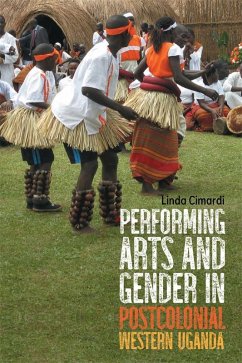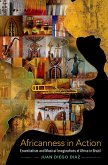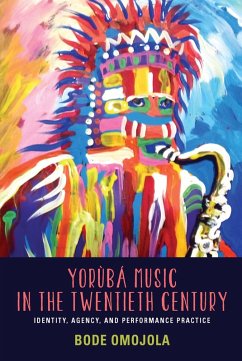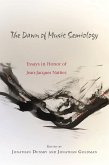Focusing on runyege, the main traditional performance genre of the Banyoro and Batooro people, this book explores the entanglement of traditional music, dance, and theater with gender and postcolonialism in Western Uganda.
Drawing on archival research and extensive fieldwork in the regions of Bunyoro and Tooro, Linda Cimardi examines the connection between traditional performing arts and gender in western Uganda. The book focuses on runyege, the main genre of the Banyoro and Batooro people, exploring its different components of singing, instrument playing, dancing, and acting and identifying their complex relationships to gender models and expressions. Today mainly performed at Ugandan school festivals and by semiprofessional ensembles, repertoires like runyege adhere to stage conventions that have developed over several decades. Some of these conventions are powerful devices allowing the actors involved (performers, teachers, students, adjudicators, and audiences) to collectively shape an image of local culture grounded in a gender binary that is perceived as traditional. At the same time, stage conventions are exploited by some performers to negotiate their gender identities and expressions in unconventional ways, thus challenging hegemonic gender models. Moving between analysis of historical recordings, oral accounts, and present-day fieldwork data and experiences, the book engages in a comprehensive analysis of the postcolonial entanglement of arts and gender.
Audio and video recordings presented in the book can be accessed on the book's companion website, http://hdl.handle.net/1802/37373.
Drawing on archival research and extensive fieldwork in the regions of Bunyoro and Tooro, Linda Cimardi examines the connection between traditional performing arts and gender in western Uganda. The book focuses on runyege, the main genre of the Banyoro and Batooro people, exploring its different components of singing, instrument playing, dancing, and acting and identifying their complex relationships to gender models and expressions. Today mainly performed at Ugandan school festivals and by semiprofessional ensembles, repertoires like runyege adhere to stage conventions that have developed over several decades. Some of these conventions are powerful devices allowing the actors involved (performers, teachers, students, adjudicators, and audiences) to collectively shape an image of local culture grounded in a gender binary that is perceived as traditional. At the same time, stage conventions are exploited by some performers to negotiate their gender identities and expressions in unconventional ways, thus challenging hegemonic gender models. Moving between analysis of historical recordings, oral accounts, and present-day fieldwork data and experiences, the book engages in a comprehensive analysis of the postcolonial entanglement of arts and gender.
Audio and video recordings presented in the book can be accessed on the book's companion website, http://hdl.handle.net/1802/37373.
Dieser Download kann aus rechtlichen Gründen nur mit Rechnungsadresse in A, D ausgeliefert werden.









